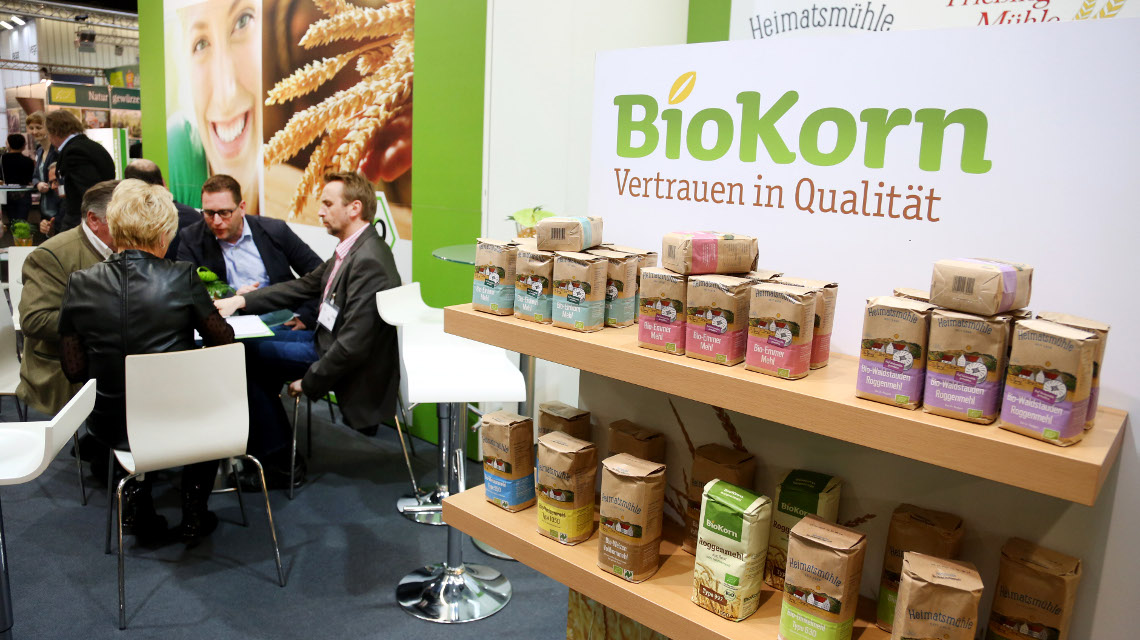Calls for more research into organic farming
Organic farming is booming, yet there is still too little applied research being performed in this area, criticise experts. That will soon change.

Organic food is in fashion: in 2016, revenue in this sector grew by almost a tenth in Germany, increasing to 9.5 billion euros. This is according to the latest industry figures put forward in honour of the world's largest specialist trade fair for organic produce 'BIOFACH' that took place between 15 February and 18 February in Nuremberg. In Germany alone, land cultivated for organic farming has increased by almost 9% to a figure of 1.2 million hectares, according to information provided by the Bund Ökologische Landwirtschaft (BÖLW). There are a total of 26,855 agricultural businesses operating in the organic sector with 40,000 companies working in line with the organic standard laid down by law. In 2016, an average of five businesses per day switched to organic farming, according to BÖLW statistics. Organic produce is also popular with customers: surveys suggest that half of Germans buy organic goods regularly or on occasion, nowadays.
Strategy on organic farming published
For the reasons outlined above, the Federal government also aims at strengthening the organic farming sector. This was recently emphasised in the newly published "Deutschen Nachhaltigkeitsstrategie" [German Sustainability Strategy]. By 2030, the long-term goal of a 20% increase in farmland availability for domestic organic farmers is expected to be achieved. In the "Zukunftsstrategie ökologischer Landbau -ZöL"[Future strategy for organic farming], the Federal Ministry of Food and Agriculture (BMEL) will now clarify exactly how it hopes to reach this objective. "Our farmers should take advantage of the growing sales market on their doorstep", emphasises Minister Christian Schmidt. The paper, consisting of approximately 100 pages, lists how to increase land utilised for organic farming and which research measures are key to ensuring this objective. Germany's main research programme for organic farming, the "Bundesprogramm ökologischer Landbau und andere Formen nachhaltiger Landwirtschaft" (BÖLN)", will thus receive more funding than previously granted. From 2018, a planned budget increase of 50%, leading to a figure of 30 million euros per annum, will be put into force. Furthermore, the growth and processing of protein crops such as soya, lupins, peas or clover will be supported by an additional 6 million euros annually.
BÖLW welcomes BMEL Strategy
Felix Prinz zu Löwenstein, Chairman of the Bund Ökologische Lebensmittelwirtschaft (BÖLW), welcomes the BMEL strategy. At the inaugural event of the Biofach press conference in Nuremberg, the chairman explained that the boost for BÖLN is long overdue and represents initial funding measures, particularly towards research in the organic sector. He emphasised that "the promise to provide sufficient means for conventional farmers to make the switch to organic farming within the next few years is a very important signal to all farmers" and continued by saying that: "ZöL measures address the entire value chain from field to fork. It is vital for the organic sector to develop across the board, from rolling-out domestic production to increasing the demand for local organic food, thus achieving Germany's sustainability and climate goals.”
Dafa research group presents own strategy
The Deutsche Agrarforschungsallianz (DAFA) presented its research strategy for the organic food industry just in time for Biofach 2017 in Nuremberg. The strategy, which took more than two years to be put together, demonstrates how agricultural research can contribute to clear improvements in the performance and competitiveness of the organic food industry, and can also validate its claims of sustainable economics, in particular. The strategy includes a warning by experts that this goal will not be achieved until the end of the 21st century, unless the pace begins to pick up. Authors of the 56-page paper call for research that focuses on key topics, the development of effective research funding programmes, and for a considerable increase in funds to be provided. Experts consider that such key topics should include new structures in plant breeding, technical innovations in plant farming, and the enhanced processing and shelf life of organic food. This should also incorporate new methods for monitoring the adherence of IFOAM principles on the global marketplace, in line with corporate ethical guidelines.


